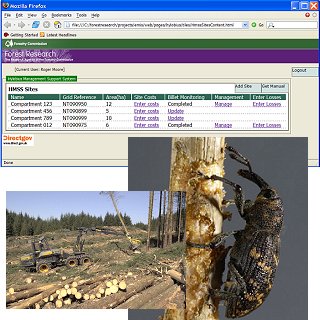The Hylobius MSS is currently unavailable online (April 2025). Updated information will appear here in due course.
 The Hylobius MSS is a decision support system to help foresters predict and reduce damage and costs due to large pine weevil, Hylobius abietis.
The Hylobius MSS is a decision support system to help foresters predict and reduce damage and costs due to large pine weevil, Hylobius abietis.
Hylobius abietis can cause extensive feeding damage to young trees used to restock clearfell sites, but damage is often highly variable. Previously it has not been possible to predict damage and so insecticides have been routinely used to protect the trees to try to safeguard this valuable young crop. However, on clearfells where Hylobius numbers are low this treatment may be unnecessary and conversely when numbers are very high the treatment may be unable to protect the trees. Both of these situations result in losses in valuable resources.
Reduced costs of restocking achieved primarily through reduced insecticide use and reduced beat ups.
The Hylobius MSS can be used to help decide on the:
The real power of the Hylobius MSS is that it is being developed to determine the effects of changes in management strategies both alone and in combination on a site-specific basis. It reduces the risks inherent in management practices based on assuming ‘average’ severity and duration of Hylobius attacks.
Basic site information, site operational costs (defaults available) and Hylobius monitoring data are input to the system. Once entered users can either investigate:
The Hylobius MSS is currently unavailable online (April 2025).
Updated information on the Hylobius MSS will appear here in due course.
Training has historically taken place annually in April/May and July just prior to the times when population monitoring should be carried out. Details of upcoming courses will be published on Forest Research’s events pages.
We hope to develop online training documentation in the future.
The billet monitoring element of the Hylobius MSS can also be offered by Forest Research Technical Services Unit.
Contact the Forest Research Hylobius MSS Team to subscribe or discuss your requirements and any questions you may have.
To register and subscribe or to discuss your requirements and answer your questions contact: